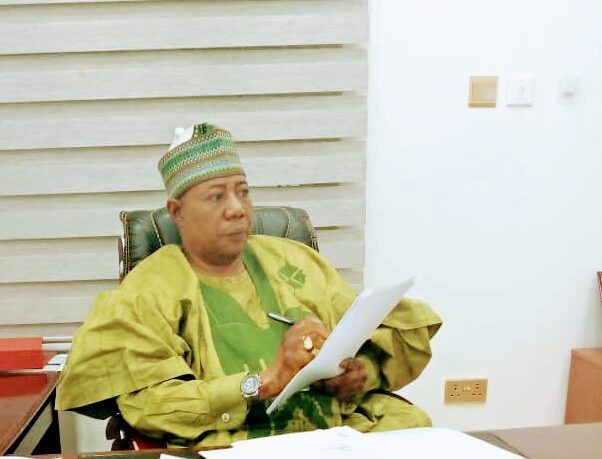A wise man once said, “To be a good leader, you sometimes need to go down the untraveled path. Being bold in the face of uncertainty will help give your team courage and motivate them to keep striving when the going gets tough.” The foregoing explains President Muhammadu Buhari’s doggedness in sticking to his resolved to tackle corruption in Nigeria.
The choice of Abdulrasheed Bawa as substantive chairman of the Economic and Financial Crimes Commission (EFCC), following the fall of Ibrahim Magu was quite instructive. Despite the enormous hues and cry that followed Bawa’s appointment, the story in the anti-graft agency is different today. Those who criticised President Buhari for appointing a 40-year-old as EFCC chairman are now justifying his decision. That speaks volume of his sterling leadership qualities.
In his bid to get difficult things done, Buhari rarely follows the crowd because he who wears the shoes knows where it pinches. He is the vision bearer; hence, he knows the quality and character of those that can get the job done.
Bawa had from inception assured that his performance will pave a new path to governance for young Nigerians. A year after that solemn declaration, evidence, it said, is the end of argument. The results of the vigour, doggedness and vitality Bawa brought to bear in EFCC, has led to secure more than 978 convictions in 2021. Former governors were not spared, as some of them are, including a jolly Reverend Minister who was governor in one of the North East states under the PDP. One of the former governors who was convicted and started serving his jail term got divine intervention when the Supreme Court reversed his conviction on ground of technicalities.
This feat couldn’t have been possible without the unflinching support of President Buhari’s principle of non-interference in the operations of the anti-graft agency. This is contrary to what was obtainable in the pre-Buhari era where the nation’s anti-graft agencies were reduced to mere political tools and attack dogs. In earnest, could it have been possible to achieve this humongous number of convictions without the support of the executive and the judiciary?
One area Bawa is leveraging on at EFCC is building bridges of understanding with institutions involved in the anti-corruption crusade like the National Judicial Institute (NJI) where has has been able to get a good buy-in of the judiciary in support of the EFCC. The relationship between the judicial institute and EFCC has helped in securing hundreds of forfeiture orders, leading to the recoveries of billions of Naira for various state governments and individuals. The NJI has been, in active collaboration, embarking on capacity building for judges, justices, investigators and prosecutors in the areas that would enhance the administration of criminal justice system.
Also, EFCC under Bawa has embraced the use of technology in all its mandate areas and is working on several policy documents that will improve the commission’s effectiveness. Bawa amplified Nigeria’s commitment to the fight against corruption at the Special Session of the United Nations General Assembly and called on global leaders to support the unconditional return of stolen assets to victim states for development financing and implementation of the agenda 2030 for sustainable development. At the Cambridge International Symposium on Economic Crime, Bawa advocated for informal communication and intelligence sharing amongst relevant law enforcement agencies across the globe as a means to successful action against economic crimes.
Without any doubt, anti-corruption fight under Bawa has taken a new dimension, which is already bringing back the sincerity and honesty of Nigeria before the international community. With his energy as a youth and his vast experience, Bawa has continued to ensure rapid, yet careful investigations and prosecutions of defaulters in EFCC. He recovered huge sums, including N152,088,698,751.64; $386,220,202.84; £1,182,519.75; €156,246.76; 1,723,310.00 Saudi Riyal; 1,900.00 South African Rand, and 1, 400.00 Canadian Dollars as well as a digital currency component with 5, 36957319 Bitcoin and 0.09012 ethereum.
With 978 convictions in 12 months, EFCC’s records under Bawa are above average, setting a standard that has never been achieved before now. The convictions Bawa secured for the year 2021 has superseded previous records of the year 2016, 2017, 2018 & 2020 put together. Even in 2019 when the record of the conviction rose to 1,280, it was still below Bawa’s EFCC, displaying to the world his momentum, agility and capabilities to drive the commission higher. Bawa’s Convictions were not centred in one location, they were spread across states to ensure that the country as a whole benefit in the fight against corruption.
The records of convictions made from Zonal Commands under Bawa in the last one year are as follows: 38 from Sokoto, 324 from Ibadan; 481 from Lagos; 137 from Illorin; 170 from Benin; 230 from Port Harcourt; 94 from Abuja; 173 from Enugu; 142 from Uyo; 64 from Kaduna; 121 from Kano; 58 from Gombe; 22 from Makurdi; 26 from Maiduguri, and 140 from headquarters.
The total recovery within one year amounts to $386, 220, 202.85, which is the equivalent of N152, 088, 695, 751.64, with Lagos having the highest amount of N70, 315, 911, 260.52.
Since coming on board, Bawa has continued to set standards and achieve uncommon feats through innovative strategies in tackling economic and financial crimes. He has prioritized prevention through deliberate strategic actions designed to identify and address vulnerabilities within the relevant sectors of the economy. Bawa has also led the development of strategic advisories for informed policy decisions by the government, including the implementation of Advance Cargo Declaration/Cargo Tracking Note for Crude Oil Exports to curb crude oil theft.
These advisories have started to change the narrative in doing government business, while enhancing transparency and accountability in public expenditure. Enforcement action is guided by actionable intelligence and aimed at achieving and sustaining measurable outcomes against crimes.
The Bawa administration also embarked on internal reforms that transformed the commission in line with international best practices. Barely 10 months, the commission developed 26 Departmental Standard Operating Procedures, and 21 policies and manuals to guide, standardise and strengthen the institutional capacity of the commission. The commission also launched a 5-year strategic plan with clear objectives aimed at effective law enforcement action against Economic and Financial Crimes.
However, it is not yet uhuru, as those involved in the arms deal and petrol subsidy scandals are still walking freely and enjoying their loots, while the Nigerian treasury is in dire need of money to fund the national budget. The onus lies in Bawa and his team of eggheads at the EFCC to pursue these people wherever they are; prosecute them and recover the loots.
-Ibrahim is director, Communications and Strategic Planning, of the Presidential Support Committee (PSC).




